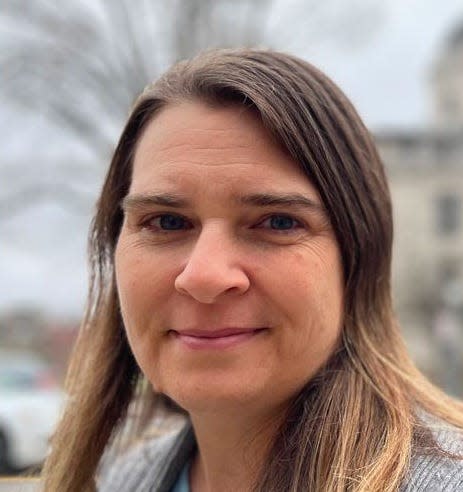Election preview: City Council District 3 candidates on cooperation, housing, crime
Incumbent District 3 Bloomington City Council member Ron Smith, who retired from the Indiana Division of Aging, faces two challengers in the primary: Hopi Stosberg, a former secondary math teacher, and Conner Wright, an IU student. District 3 also has the only Republican candidate for city council, Brett Heinisch, an account specialist at Storage Express, who is unopposed in the primary.
Early voting begins April 4. Primary election day is May 2. A map of the new council districts: tinyurl.com/5n8szcm7.
Q: Which problem facing the city is the first you would want to see addressed if you get to serve on the council?
Heinisch: The main issue of my campaign is preventing and reducing crime. We have seen crime consistently rise since 2012 and it is a threat to both regular residents and potential visitors which threatens our town’s quality of life and our local economy. With so many people coming from different parts of the country to visit or get an education at IU, and so many full time residents who live here, the city has a huge duty to protect everyone and address their needs. This is also complicated with a large homeless population locally and a growing mental health crisis nationally.

If elected, I will do everything within my power to make sure that the citizens are protected, safe, and secure. Anything that can help our police enforce the law, arrest criminals, and serve the common good must take my priority. Though there are many other issues I believe to be important, such as reduced drug addiction and economic development, this is the main one that will be in my area of interest if elected.
More:Bloomington violent crime update: Twenty-three cases from 2022 to follow in 2023
Smith: Poorly managed growth is the number one problem that I'd want to see addressed. Many of the problems we see are an extension of poorly managed growth. You can see poorly managed growth by experiencing the traffic congestion on East Third Street and seeing the massive market-rate apartment complexes oriented to the student population. The complexes being built are too large for the area infrastructure capacity and only addressprofit motives.

Look at the KMART development. It's too large, over 700 bedrooms, too tall and isn't consistent with the area building heights, and there is no workforce/affordable housing in the complex due to the “payment in lieu” of affordable housing. This is poor planning, and glaringly, it does not address affordable housing in our community at all. Common sense says we need to manage growth better for our community.
More:Five big projects coming in 2023 include library branch, apartments, restaurants
Stosberg: One of the current challenges I see is the lack of cooperation and attempts at respectful communication and consensus building among different government entities. As a current government outsider, I see room for improvement in this area.

Though the different pieces of the local government system are focused on different aspects of livability in Bloomington and Monroe County and are responsible for different roles, each piece has some dependency on other pieces and in order to maximally benefit citizens, the pieces must fit together in cooperative ways in order to move forward on large goals related to quality and sustainability of life in Bloomington and Monroe County.
More:'Disingenuous': Bloomington annexation causes city council, county commissioner clash
Wright: If I am lucky enough to serve on the City Council, I would most like to see our growing housing affordability crisis addressed because this problem requires medium and long-term solutions which means we need to act fast to help as many people as possible.

Q: County officials are reluctant to allow dense housing developments on the city’s fringes. The city council has allowed small steps for densification in core neighborhoods, but builders have not responded by building many duplexes. Instead most new units being built are expensive high-rise apartments. What legislation would you propose that would increase the availability of affordable housing units in Bloomington? How much would that cost? How would you pay for it?
Heinisch: I am usually against densification as the focus on development should be aimed at community and individual investment. There are times when apartments are necessary, but people who own homes are more likely to invest in their communities and themselves. Prioritizing rent opportunities leads to people who are here temporarily and would have the ability to leave the moment their contract ends or if they decide to leave for other opportunities early.
I think that development needs to prioritize housing, and community in ways that will make the public want to engage. I know from talking to county officials that there is much open land that could be considered for housing and to grow the city. There are also programs like Habitat for Humanity that we can work with to help build houses for people that are having trouble affording it. The city should expand its work with such organizations and make sure that we are getting everyone involved to expand opportunities for all city residents. For this reason, I think we should not prioritize densification but instead make sure we are building housing that will both keep people in the area and be plentiful enough to keep prices down.
Smith: I will work to propose changes in the Unified Development Ordinance to include “Workforce/Affordable Housing” when developers want to build apartments are over a certain size such as more than 50 units. I will also propose “Fast Track” approval on affordable/workforce housing as an incentive to encourage developers to build more affordable/workforce housing.
Because Indiana does not allow for “exclusionary housing” under Federal Fair Housing regulations, the legislation must incentivize such development rather than require it. Such legislation does not cost city taxpayersanything and would not require an additional tax.
Stosberg: Increasing housing stock is one key to ensuring individuals and families are able to find housing that meets their needs and is affordable for their budgets. Currently there are many eyes on housing and many ongoing initiatives that seek to address the issues of supply and affordability.
Though this question implies that “expensive high-rise apartments” are a negative addition to the Bloomington housing market, developers believe that these units will end up being desirable and occupied. This could create more opportunities for affordability in existing complexes.
Additionally, the Hopewell development and Summit Hill Community Development land trust project are looking to add more housing options in Bloomington. Before proposing specific legislation and related costs I am interested in seeing how these and other new developments end up affecting the Bloomington housing market.
Wright: I would propose several pieces of legislation to encourage the development of affordable housing in Bloomington. I want the City to offer no-interest loans through the Housing Development Fund. These loans would go only to projects that are entirely affordable housing. By doing this, we will lower the cost of affordable housing development and encourage its creation.
I also want to offer tax abatements for developments that will at least partially cover the cost of lost revenue as a result of the affordable housing.
Lastly, I want to increase the development of affordable housing or funding for the Housing Development Fund for future development. For example, if an apartment complex wants to add an extra floor that would normally not be permitted, they will be permitted to do so if they make the entire floor affordable or if they pay into the Housing Development Fund.
More:Building a home? 'The day of the $175K starter home is gone' in Monroe County
Q: Both police and firefighters have said they are underpaid and that low salaries are prompting experienced colleagues to leave for other departments that pay more. What legislation would you propose to increase retention in police and fire departments? How much would that cost? How would you pay for it?
Heinisch: I will admit that I am new to the debate over the salaries for police officers and firemen. I admit also there are other programs that need to be addressed that would likely make work easier for police like addressing the prison situation. Still, our first responders put their lives on the line every day so it is perfectly reasonable to believe that increasing employee pay should be considered.
If elected, I do intend to do a review of various development and expansion projects such as the convention center expansion and reconsider if those are a good public investment. If we find programs deemed unnecessary and end them, we will surely have the money needed to cover a salary increase and we can use that to attract and keep firefighters and officers. This is why prioritizing public funds is so important and why we need someone in charge who can make sure our money is being used efficiently.
Smith: I advocated and voted to increase Bloomington Police Officer salaries because we were losing staff to surrounding communities due to lower wages. Comparative data was analyzed and confirmed this disparity. Now we find ourselves in the same situation with our Fire Department. Common sense says the current administration should have anticipated and prioritized these essential service increases instead of purchasing more real estate, adding more non-essential infrastructure or paying over $2 million dollars so far to fight Annexation.
I will advocate for and vote to fund raising Fire Department salaries to be competitive with surrounding communities so we don’t lose more well-trained staff. I am unsure exactly how much this will cost as the analysis of comparative community salaries has yet to be completed. By using a portion of the additional $14 million dollars in annual local income tax (LIT) that was approved by council we can fund this increase. The city has adequate financial resources and city administration should not hold the City Council hostage at budget time to increase the Local Increase Tax increase as was done with the Police salary issue. This is plainly the wrong way to address essential Public Safety.
Stosberg: I don’t think that legislation is an appropriate tool for incentivising retention of employees. As a city councilor I would support union negotiations regarding standards for compensation, including salary and benefits, for our police and firefighters.
Additionally, efforts toward housing affordability, mental health services, well designed transportation corridors, and code enforcement can increase overall safety and stability of the community which can positively impact job conditions for all first responders.
Wright: To raise the salaries of police officers and firefighters substantially in the short-term, we will have to either make cuts to other parts of the budget or raise taxes by a small percentage.
We can make medium to long-term increases possible by reducing operating expenses for our police and fire departments. One way we can do this is by purchasing electric vehicles to replace the old ones in their fleet, saving thousands of dollars on fuel per vehicle each year. The money saved could go back into the salaries of our officers.
That being said, if our police and fire departments start to struggle to meet the high standards they have set for themselves, then I would support a small increase in taxes to pay police officers and firefighters more, as I see very little in the budget I could cut. I believe this is a worthy sacrifice to ensure the further protection of our community as those who protect and serve our city should be able to easily afford to live in Bloomington for the duration of their careers.
District 4
District 4 incumbent Dave Rollo, a Democrat, is seeking re-election. He has no primary challenger, and no Republican has filed either. Rollo did not respond to email and phone messages seeking answers to The Herald-Times candidate questionnaire.
This article originally appeared on The Herald-Times: City Council District 3 candidates discuss cooperation, housing, crime

